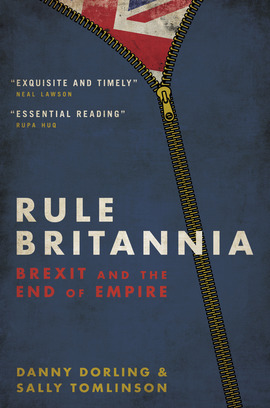Ahead of the publication of Rule Britannia in paperback, authors Danny Dorling and Sally Tomlinson take a look back the past two years of electoral chaos and what that might mean for Britain going forward...
 Who now remembers 2019, a year of panic and chaos, in which so many Brexit deadlines were missed, promises to die in ditches were not kept, and eventual claims were made that Brexit was ‘done’ and ‘we’ had taken back control? The first edition of this book ended in January 2019, when all this was to still come.
Who now remembers 2019, a year of panic and chaos, in which so many Brexit deadlines were missed, promises to die in ditches were not kept, and eventual claims were made that Brexit was ‘done’ and ‘we’ had taken back control? The first edition of this book ended in January 2019, when all this was to still come.
After the fireworks and triumphal gong-banging came a global pandemic that wiped Brexit off the headlines and out of minds. This edition of Rule Britannia is an updated version, revealing the truly sorry story of 2019 and the first half of 2020, a time when notions that Britain could embrace a new post-imperial identity, and that a civilising process could begin, rapidly disappeared. The low points of 2019 included the appointment of a special advisor in No. 10 who planned to employ ‘weirdos and misfits’, and the spreading of a now demonstrably false narrative that people in deprived northern areas had won the Leave vote.
This is a hopeful book. However, for those who relish misery we point out that, long before the word pandemic was uttered, every sector of the British economy was in deficit; more and more British children were growing up in poverty; homelessness had become normal; the nation was living on borrowed money with increasingly poor mental health; and Iain Duncan-Smith’s universal credit was revealed to be a cruel universal failure. The British state was already in crisis.
It was a year of elections, votes and lies. The Conservatives lost 1330 local councillors in the spring elections, while Labour lost just 84. Nevertheless, this was reported by the BBC as ‘voters delivering a stinging rebuke to both parties’. And at this time (the last time local elections were held anywhere in the UK), despite claims that far right movements were rising, in fact support for the far-right was declining rapidly in Britain. This good news was overtaken on 24 May when Theresa May resigned.
The Tory leadership contest which followed demonstrated again the influence of an elite, the same group whose forbears were used to running an empire, with all the feelings of entitlement and self-interest that entails. Most of the thirteen candidates were privately schooled Oxford alumni, and a man whom only 10 per cent would trust to babysit their children was elected leader of the Conservative Party: Boris Johnson.
The Labour Party under Jeremy Corbyn had expanded its membership to over half a million, but the leader continued to be demonised. His support for the two-state solution in Israel-Palestine was behind the campaign to paint him as an anti-Semite. It was ironic that the spending programme on which Labour was defeated in the general election in December 2019 was adopted and then doubled in size, at least in scale, by the Tories in spring 2020, when billions were promised to shore-up a locked-down population and economy. It turned out that such generous spending was possible.
The Conservative government continued its imperious trajectory. MPs defeated in the general election were elevated to the House of Lords. Dominic Cummings, who had been found in contempt of Parliament in March for refusing to appear before a select committee, was appointed special advisor. Privy to insider information, when he fled London for Durham he made clear what he thought of those he left behind, those who continued to follow the lockdown instructions he had help devise.
This is not a book about the Covid-19 virus, of which hundreds of books will be written. Instead this book tries to explain why Brexit is so closely mixed up with a particularly abject lack of knowledge about Britain’s imperial past and a deep anxiety about Britannia’s place in the world, combined with a nostalgia for days about which we do not tell ourselves the truth. The British have been presented with lies about their future out of the European Union, by people who are so used to lying they may not know remember what it is like to speak honestly.
This book ends with the good news. There is hope for the future, but it will not involve taking back control or rekindling a lost empire.
Rule Britannia is available to pre-order now as a paperback and will be out on 23 June. Take a look at it here!
